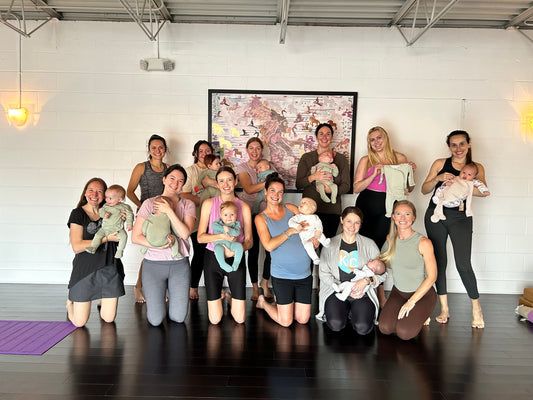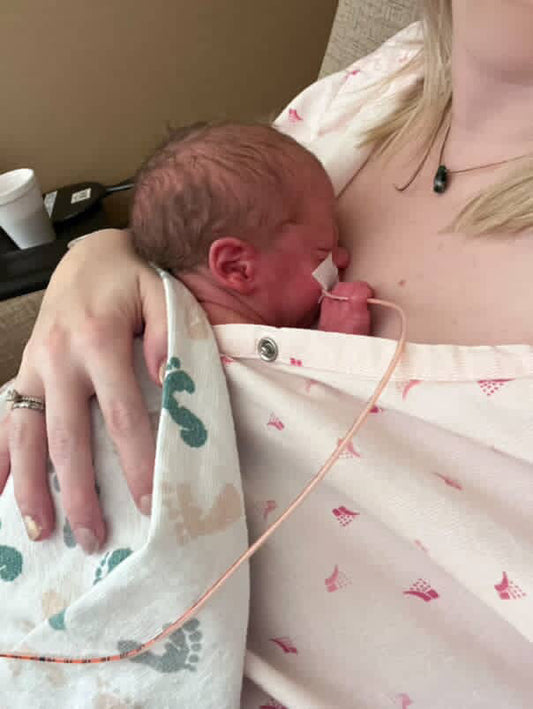Share
Newborn Vision and Early Eye Exams
Navdeep SinghBonsie joined in conversation with Dana Spearin, a mother, eye doctor, and content developer. Dana shared some important information with us about babies’ eyesight as a newborn, how their vision changes, and early eye exams.

Dana Spearin gives her baby an eye exam
Newborn Vision
Newborn babies can’t see very well or very far and are sensitive to light. Their vision ranges from 20/200 to 20/400 and they can only see about 10 inches from their face. That’s the perfect distance for your baby to look up at your beautiful face while she breastfeeds or snuggles in your arms. Newborns are able to pick out contrast but are unable to see details or colors other than black, white, and grey.
Fun fact! Being able to see contrast helps newborns find their mother’s nipples to breastfeed.
Because newborns can only see about 10 inches away, they spend a lot of time studying the features of their mother’s face. This essential time together, memorizing each other’s uniqueness, allows for bonding and facial recognition. Simply looking at each other is helping your newborn learn, feel safe, and adjust to their new world. (Don’t forget about the importance of physical touch and skin-to-skin contact to help them adjust as well!)
How vision develops during an infant's first year of life
Just like when your child learns to walk, vision is something that is practiced and perfected. The ability to focus our eyes, use them together as a team, and see clearly are all learned skills. Vision changes rapidly during your infant's first year of life and visual development can greatly impact physical development.
During the first four months of life, your infant will learn how to track a moving object and start to reach for it. Eye teaming at this point is not usually well developed. It is common for your child to go cross-eyed once in a while. (If you notice your infant's eyes stay crossed, or it becomes more frequent, it is best to get it evaluated by your local optometrist.)
From five to 12 months of life, your infant's eye teaming will improve and their color vision will be fully developed. Spatial awareness and hand-eye coordination greatly improve when your child learns to crawl. It’s best to encourage crawling before walking so the visual system is able to practice hand, eye, and body coordination. Visual development is integral to physical development. If gross and fine motor skills are not learned during the appropriate sequence, visual development may not get a chance to perfect its skills.
What parents should know about early eye exams
Did you know that babies can get their eyes examined too? It is recommended that babies get their first eye exam by an eye doctor between 6 to 12 months of age. Some eye doctors participate in the public-health program called InfantSEE, which provides no-cost comprehensive eye exams to infants between the ages of 6-12 months. This program aims to integrate vision in the overall-wellness picture, as oftentimes for pediatrics it is forgotten.
Sadly, many parents are given a false sense of security that their child’s vision is developing as it should when their child passes the eye screener. Screeners tell you very little about your child’s eye health and development, which is why doctors of optometry advocate for early comprehensive eye exams. Vision is very important to learning, playing sports, and overall quality of life.
What are some symptoms of visual distress?
Many eye conditions do not have any visual symptoms, and oftentimes children are too young to communicate with you or understand that there is something wrong. Even if you don’t notice any signs of visual distress, it is recommended to follow up with an eye doctor for theira yearly exam or recommended exam intervals.
Alternatively, infants who rub their eyes excessively, have a frequent or worsening eye turn, continually close one eye, turn their head to see, squint, have a white pupil or cloudy eye, or have excessive watering should see an optometrist.
More about Dana

Dana Spearin, eye doctor, mother, and content developer.
Dana is the co-founder of Luke Knows. She loves teaching other parents things she wished she would have known before having children, sharing what she has learned about motherhood, and giving insight into what having a career outside of the home and children is like. You can follow her on Instagram at @theofficiallukeknows
Share
-
Category:
- All posts



